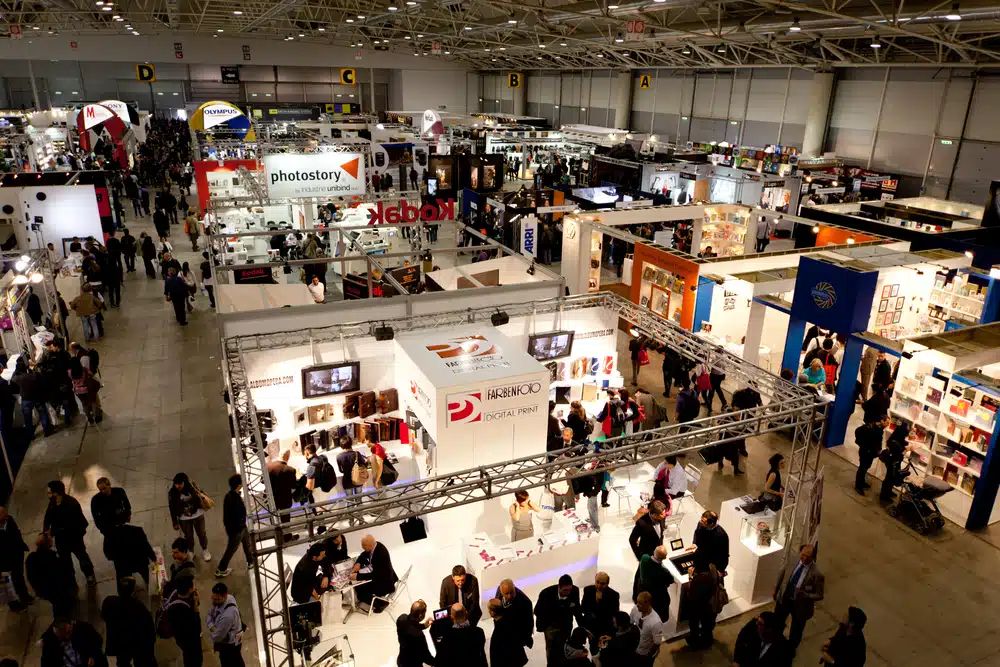Business-to-business models involve companies that sell products or services to other organizations, typically within the supply chain — think of raw materials and logistic solutions. B2B marketing involves strategies for selling those products and services, including referral marketing and direct transactions.
B2B event marketing takes traditional marketing up a notch with entire conferences or trade shows dedicated to a product or service. Marketing these events is challenging, often requiring a little finesse and a lot of data.
What Is B2B Event Marketing?

Despite the terminology, event marketing is not the same as marketing for an event; it is about using events to market and sell products or services to other businesses. These marketing events are crucial for brand engagement, lead generation, strategic partnerships, feedback, promotion, and profits.
If advertised and promoted correctly, event marketing can accelerate business growth and increase innovation in the industry through connections and interactions.
Event marketing is a helpful method for promoting B2B brands because there are several event options, including trade shows and conferences. The preferred method or event marketing strategy depends on a brand’s purpose, goal, or expected outcome.
Trade Shows
Trade shows can be in-person, virtual, or both. Trade organizations, industry associations, individual businesses, or event companies may sponsor the event. The beauty of a trade show is it provides an opportunity to showcase a product or service to a targeted audience. Also, the show allows a company to see what the competition is up to.
Conferences
Conferences focus on a specific industry or topic and may include workshops, presentations, and networking opportunities. Like trade shows, conferences can be virtual, in-person, or a mix of the two.
This B2B event marketing strategy is ideal for showcasing industry knowledge and establishing a forum for blossoming partnerships. The marketing tactic allows the event sponsor to showcase their business and services.
Roadshows
Unlike most conferences and trade shows, a roadshow travels to several locations and usually promotes only one brand. Because roadshows are traveling shows, they require more planning and a larger budget than conferences and trade shows. Still, investing time and money is worth it for brands with an existing and geographically spread customer base.
Product Launches
Product launches allow companies to showcase their latest products, services, and innovations. A brand may choose to have a large public launch with open invitations or host a more intimate invitation-only gathering.
Public launches are good options for casting a wide consumer net and drumming up interest in a product or service. Invitation-only launches are best for brands with a built-in audience or customer base.
Experiential Events
Experiential marketing events are immersive and interactive. These events allow prospective consumers to engage with the brand and experience the product or service first-hand. The typical format of these events can include product demonstrations and interactive exhibits.
Experiential B2B event marketing is an excellent way to generate hype around a product or service and drive word-of-mouth advertising.
How Do You Market a B2B Event?

The event you choose should align with your campaign objectives. A trade show or public product launch might be your best bet if you want to find an audience and build hype around a product or service. A private or invite-only launch might do the trick if you’re going to showcase product upgrades and target existing clientele.
Regardless, the event type you choose also requires marketing. People need to know where and how to experience your new product or service, and this type of promotion falls back on six fundamental marketing principles.
1. Define a Target Audience
Before you can build a successful marketing campaign for your B2B event, you must have a target audience in mind. Knowing your target audience allows you to create messaging and advertising strategies that communicate with that market. For example, if you operate in the early education sector and target young teachers and leading elementary schools, focus on social media and industry-specific magazines.
2. Create a Website
Event websites are excellent tools to promote B2B event marketing efforts. The website should contain several details:
- Event description
- Attractive and accessible design and layout
- Schedule
- Registration and ticketing information
- Blog, news, and social media integration
A website is a dual-purpose tool because it serves as an informational and promotional hub and a lead generator. Also, all social and traditional media campaign efforts can point back to the website, meaning it is the primary source of event information.
3. Partner With Other Organizations
Depending on the brand or business organizing the event, partnerships are beneficial. Smaller or lesser-known companies can take advantage of a more prominent or popular brand’s credibility and reputation to drive attendance to an event. Also, by partnering with brands that offer complementary products and services, a business can share the event’s costs while increasing its market share.
4. Use Social Media
Social media networks represent a tremendous opportunity for businesses, especially now that nearly every age bracket uses at least one social media site; that likely explains why 77% of companies use social media to reach customers. Social media campaigns for B2B events are cost-effective, provide reach, offer methods for engagement, and, most importantly, are measurable.
5. Offer Incentives
Another promotional strategy for B2B event marketing is to reward participation. A brand can offer discounts for early ticket purchases or special VIP access to specific exhibits. Find things your customers want that you can provide for a commitment to attend your event.
6. Use Trade Publications
Advertising for B2B events in trade magazines is a cost-effective option for reaching a targeted and loyal audience. Also, many trade publications offer competitive rates for advertising, including sponsorship opportunities.
Your Partner for B2B Event Marketing

B2B event marketing is challenging. Hosting a trade show or other marketing event requires significant planning, ticketing, and research. As a business owner or leader, you likely don’t have the time to manage every aspect of an event. That’s where Evey Events comes in — contact our team to learn more about our all-in-one event planning solution.


